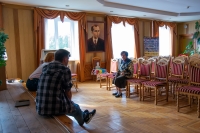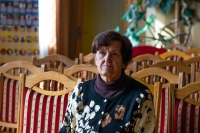Oh, we lived in Bykyn for two years - as far as I remember - for two years... He wrote a letter to Aunt Mariya… no-no, to Aunt Lisa… my grandmother's sister, they lived standard, they had an apartment.
Grandmother's sister - Aunt Lizia, she was called - "Aunt Lizia". Osypenka, 16 - I remember it even now - everyone knew that address and apartment. And dad thought, where should he write - he decided to write to Osypenko, and they would already know how to let us know. And my mother wrote to Aunt Lizia to the Osypenka street, they corresponded because the postal service was working. And dad wrote a letter to Aunt Lizia, and Aunt Lizia sent it to us - we all cried a lot, it was a small piece of paper and an address with dad's handwriting. Mom cried a lot, of course, it was hard. And he said in the letter, he was still alive and that he found us. So we wrote to dad, we were allowed to write, but dad couldn't write us. At first, it was once a year. We could send a parcel once a year, once a year, I don't know how often, for two years - the first years were very difficult. And there are those couple of letters, those first letters, I think I still have them. Every time I read those letters I cry. Because I wrote memoirs, you know, I typed them a little on the computer - then I was crying so hard, I told my son, I couldn't continue. Two hours - no more, I wasn't able to work more than two hours because it's all memories, it's hard.
And what did dad write in general, what did he write about?
Dad had censorship. When the letter from Dad came, half of it was crossed out. I still have that letter in the museum, it will have to be taken away, half of it was crossed out.
Dad said - it's alright, I manage to live somehow, I work as a routine soldier there, and a year counts for two - oh, it didn't help, he had to serve the whole sentence. He was sentenced to 25 years. Dad said - a year counted for two, but he didn't have a salary - no money, but a year for two, they cheated. I understand they were fooling everyone around a lot. Dad wrote... He asked questions, he asked about us, about our health. My mother was answering something - one child was sick, the other was coughing. My father wrote some prescriptions, my father wasn't a doctor, but he loved folk medicine and read a lot of books there, he ordered books on folk medicine. He loved medicinal plants very much because my father himself in his youth years, as he studied at the seminary in Frankivsk, and then in Lviv - he had a stomach ache, he had gastritis. So he knew folk medicine. One old woman in Deliatyn helped him to recover, she cured him with herbs. So my dad believed in the power of herbs and, of course, wrote many prescriptions.
He supported my mother spirit, he said - I think it wouldn't last long, maybe I'd be released soon - he always gave us some hope. And the mother wrote him, she asked whether he knew anything about boys, about their sons. Dad answered - no, I don't know. My father didn't want to write to my mother that he met had a date with their son in Lviv, with Yarko, the youngest son. Then he said to Dad, "I didn't kill." Dad said he talked to Yarko, and Yarko said - I didn't kill Galan, I'm not involved. And the officers didn't let them talk there anymore. There, apparently, they spoke with witnesses around - KGB officers were present. So, our family, we have suffered a lot. Then we went to my dad, it took us 10 days, I remember it well. I was already 10 years old.


